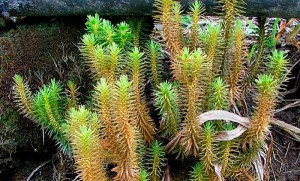Huperzine-A is a: Neurotransmitter Booster | Brain Cell Protector | Supplement for Alzheimer’s
What is Huperzine-A?
Huperzine-A (Hup-A) is a neuronutrient that is extracted from a type of moss called Huperzia serrata (also known as Chinese Club Moss) that grows in Asia.

Club moss is considered an important herb in the Traditional Chinese Medicine (TCM) system; it has long been brewed into teas that are used for psychological issues. Intriguingly, TCM’s uses for Chinese club moss match some of today’s most popular uses for Huperzine-A: Ancient practitioners valued it as an herb for memory improvement.
Bio-Activities:
- Antioxidant Brain Protector, capable of crossing the blood-brain barrier to fight the oxidative stress that may degrade brain cells and lead to Alzheimer’s.
- Neurotransmitter Booster; Hup-A boosts production of acetylcholine, a neurotransmitter associated with healthy mood and sharp memory
- Brain “Clean-Up” Agent, believed to help prevent certain toxins from building up in the brain and degenerating cognitive function
What is Huperzine-A good for?
Huperzine-A is still in early stages of research; its efficacy, therefore, is not yet conclusively known. Hwoever, due to its roles in protecting brain cells, cleaning up neurotoxins, and boosting certain brain chemicals, it is popularly used to ward off degenerative age-related cognitive problems, including dementia, Alzheimer’s disease and other brain-degenerative issues.
Huperzine-A Benefits
Huperzine-A benefits the brain first and foremost by increasing levels of acetylcholine in the synapses of brain cells. Researchers have theorized that the onset of Alzheimer’s may be accompanied by a decline in the brain’s acetylcholine levels, leading to problems with brain cells “firing” with the electrical impulses that enable cell-to-cell communication.
Hup-A is believed to boost acetylcholine by blocking certain enzymes called acetylcholinesterase inhibitors (AChEI). These enzymes dissolve acetylcholine in the brain, potentially diminishing a key brain chemical that is responsible for clear thinking and sharp memory.
Some pharmaceutical drugs for Alzheimer’s disease are designed as “anticholinesterase” agents that work to keep acetylcholine-destructive enzymes in check. Hup-A is considered a “natural cholinesterase inhibitor,” suggested to mimic the key activities of similarly-named drugs — potentially offering natural support that helps keep the brain youthful and sharp. While pharmaceutical companies have tried to synthesize the compound, its complicated molecular structure has proved difficult to copy, and as such, it is only available in natural brain supplements.
In one scientific review, researchers suggested: “There is evidence that Huperzine-A may compare favorably in symptomatic efficacy to cholinesterase inhibitors in use…. in addition, [Hup-A] has antioxidant and neuroprotective properties that suggest it may be useful as a disease-modifying treatment for Alzheimer’s disease.”1 This research underscores its role as an herb for Alzheimer’s disease.
Huperzine-A may block enzymes that are known to degrade the brain and lead to neurodegeneration — potentially helping with Alzheimer’s disease and other degenerative brain problems.
The Chinese club moss derivative also has been shown in some in vivo research to exhibit brain cell-protective activities in cases of injury. This benefit appears to be age-independent, helping both young and old, and may work in concert with its neurotransmitter-supportive properties to both protect and preserve sharp cognitive function.
- Did you know? Hup-A has roots in China that date back thousands of years, where it is still popular today. The herb is used as a prescription drug for brain issues in China, as well as being advocated by natural health practitioners for its potential beneficial roles in memory, focus and Alzheimer’s.
Huperzine-A Research: Help for Alzheimer’s Disease
In one study, 202 patients who were diagnosed with either mild or moderate Alzheimer’s disease were given 400 mcg of Huperzine-A or placebo daily. At the study’s conclusion, researchers reported that the Chinese club moss derivative “remarkably improves the cognition, activity of daily life and mood of Alzheimer’s disease patients.”2 Specifically, researchers reported Hup-A was associated with the following beneficial results:
- The Alzheimer’s Disease Assessment Scale – Cognition: 4.6 point improvement
- Mini–mental state examination (MMSE): 2.7 point improvement (30 point scale)
- Activity of Daily Life: Improved by 10% in 32.75% of the patients in the study
In addition, the research found that Huperzine-A supplements appeared to be well-tolerated, with 97% of study subjects taking the supplement experiencing zero side effects, and 3% experiencing mild adverse events such as ankle swelling and insomnia.
Huperzine-A Lucid Dreaming
Huperzine-A Supplements Use
While its name may sound like a drug, it’s important to remember Hup-A is a natural nutritional supplement. Products are sourced from Chinese club moss, and then processed to isolate and extract the moss’s “active ingredient” alkaloids. Some brain supplements may combine this Chinese club moss extract with other compounds; others may supply it in “standardized” form to guarantee certain levels of active compounds.
Huperzine-A Dosage
Before taking supplemental Hup-A or starting any routine supplementation, consult with your health care provider. Between 50 and 200 mcg (micrograms) is a common dosage range for capsules and tablets. Dosage used in clinical trials has been as high as 400 mcg.
Huperzine-A Side Effects
Hup-A is not commonly associated with side effects when taken in moderate amounts for a short-term period. Possible adverse results could include diarrhea, nausea, restlessness, hives, diminished appetite and slowed heart rate. Breastfeeding and pregnant women should not consume this supplement.
1. Little JT, Walsh S, Aisen PS. An update on huperzine A as a treatment for Alzheimer’s disease. Expert Opin Investig Drugs. 2008 Feb;17(2):209-15.
2. Clinical efficacy and safety of huperzine Alpha in treatment of mild to moderate Alzheimer disease, a placebo-controlled, double-blind, randomized trial. Zhang Z, et al. Zhonghua Yi Xue Za Zhi. 2002 Jul 25;82(14):941-4.